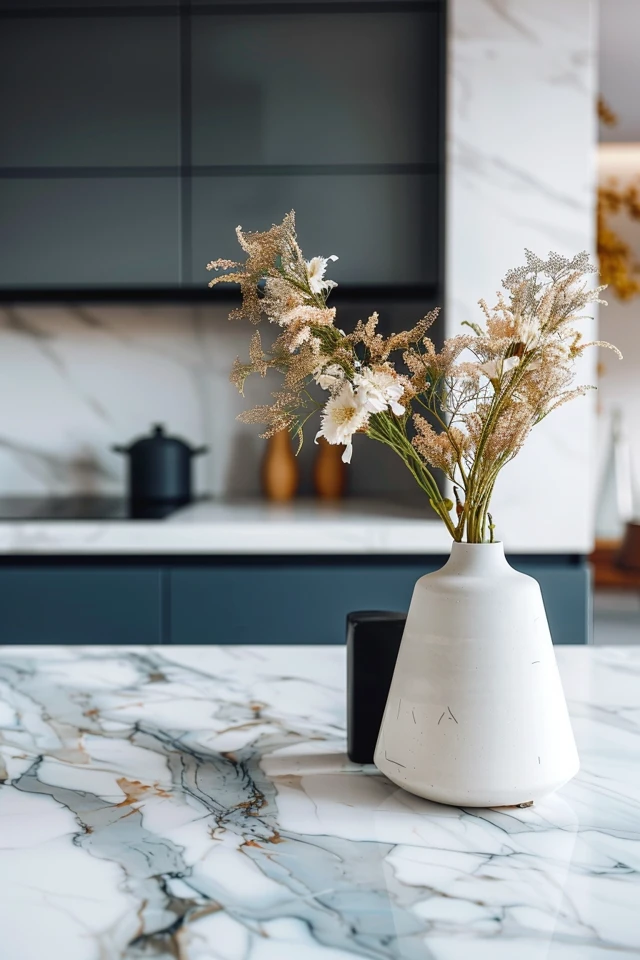Marble countertops are a luxurious addition to any kitchen, adding elegance and sophistication to the space. However, to keep them looking their best, proper care and maintenance are essential. In this guide, I will share some valuable tips and best practices for protecting and maintaining marble kitchen countertops.
Marble is a natural stone that can be susceptible to scratches, etching, and staining if not adequately cared for. By following these marble care tips, you can ensure that your countertops maintain their beauty and durability for years to come.
Key Takeaways:
- Proper care and maintenance are necessary to preserve the appearance of marble countertops.
- Avoid using acidic substances on marble surfaces to prevent etching and staining.
- Regular cleaning with a gentle soap and warm water is recommended for day-to-day maintenance.
- Deal with stains promptly by using a poultice or contacting a professional if necessary.
- Sealing the countertops periodically can provide an extra layer of protection against stains.

Best Practices for Cleaning and Maintaining Marble Countertops
Proper cleaning and maintenance are essential for preserving the beauty of marble countertops. By following these best practices, you can ensure that your marble surfaces stay in excellent condition.
1. Use Gentle Cleaners: When it comes to cleaning marble countertops, it’s important to use mild, pH-neutral cleaners. Harsh chemicals can damage the surface and cause etching. Instead, opt for a gentle soap or a specifically formulated marble cleaner.
2. Wipe up Spills Immediately: Liquid spills can quickly penetrate the porous surface of marble countertops, leading to staining or discoloration. To prevent this, always wipe up spills promptly with a soft, damp cloth.
3. Avoid Acidic Cleaners: Acidic substances like lemon juice, vinegar, or harsh cleaning products can etch the surface of marble countertops. Avoid using these cleaners and opt for gentler alternatives to protect your marble surfaces.
4. Use Soft, Non-Abrasive Tools: When cleaning marble countertops, use soft, non-abrasive sponges or microfiber cloths. Avoid rough scrub brushes or abrasive materials that can scratch the surface.
5. Seal Regularly: Marble countertops should be sealed regularly to protect against stains and moisture penetration. Check the manufacturer’s recommendations for the appropriate sealing frequency and use a high-quality marble sealer.

6. Deal with Stains Promptly: If you notice a stain on your marble countertop, address it promptly. Use a poultice made of baking soda and water or a recommended marble stain remover to gently lift the stain without causing further damage.
7. Avoid Heavy Items: Marble countertops are durable, but they can still be prone to cracking or chipping when subjected to heavy impacts. Avoid placing heavy objects directly on the surface, and always use cutting boards, trivets, or coasters to protect against scratches and heat.
8. Regularly Dust and Wipe: To maintain the shine and cleanliness of your marble countertops, make it a habit to dust and wipe them regularly with a soft cloth. This simple step can help remove surface dirt and prevent build-up.
9. Consider Professional Maintenance: If your marble countertops have deep stains, scratches, or other significant damage, it may be worth considering professional maintenance. A professional stone specialist can assess the condition of your countertops and recommend suitable restoration techniques.
By following these best practices for cleaning and maintaining marble countertops, you can ensure that they remain beautiful and in excellent condition for years to come.
Conclusion

Proper maintenance and protection are crucial for maintaining the beauty and longevity of your marble kitchen countertops. By following a few simple practices, you can keep your surfaces looking stunning for years to come.
To protect your marble countertops, it is essential to avoid using acidic substances such as lemon juice, vinegar, or harsh cleaners. These can cause etching and damage the surface. Instead, opt for gentle soap and warm water for regular cleaning.
Dealing with stains promptly is also important to keep your marble surfaces in pristine condition. Blot spills immediately with a soft cloth or paper towel to prevent staining. For stubborn stains, use a poultice made of baking soda and water or a specialized marble stain remover.
Additionally, consider sealing your marble countertops periodically to enhance their resistance to scratches and stains. This protective layer acts as a barrier against spills and prevents absorption. Follow the manufacturer’s instructions for proper sealing and ensure you reapply as recommended.

